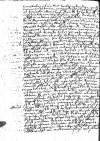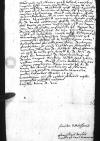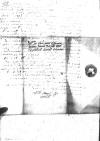Video de profectione Cracow (Kraków, Cracovia), city in southern Poland, Małopolska, on the Vistula river, from 1038 capital of the Kingdom of Poland⌊hucCracow (Kraków, Cracovia), city in southern Poland, Małopolska, on the Vistula river, from 1038 capital of the Kingdom of Poland⌋ sua Reverendissimam Dominationem Vestram nonnihil vacillare ac magis in eam partem inclinare, quod istic manere velit. Quae res valde perturbavit animum meum, nam de mure metuo, si non venerit Reverendissima Dominatio Vestra, cuius praesentia sola plurimum esset momenti allatura. Nemo enim in hac quidem causa plus esset auctoritatis habiturus.
Johann von Werden (*1495 – †1554-08-25/28), 1526 Mayor of Gdańsk, from 1527 Starost of Nowe, 1532-1535, 1538, 1539, 1546, 1551 Burgrave of Gdańsk, from 1535 Starost of Preußisch Mark (1535-1540 together with Achatius von Zehmen), 1536/1537 envoy of the Prussian Council to the Cracow Diet⌊ConstellatusJohann von Werden (*1495 – †1554-08-25/28), 1526 Mayor of Gdańsk, from 1527 Starost of Nowe, 1532-1535, 1538, 1539, 1546, 1551 Burgrave of Gdańsk, from 1535 Starost of Preußisch Mark (1535-1540 together with Achatius von Zehmen), 1536/1537 envoy of the Prussian Council to the Cracow Diet⌋ simul ut venit, a Piotr Gamrat (*1487 – †1545), 1531 bishop of Kamieniec; 1535 - of Przemyśl; 1538 - of Płock; 1538 - of Cracow; 1541 archbishop of Gniezno and primate (he didn't abdicate Cracow bishopric); 1532-1538 general commissioner and admistrator of Crown lands in Masovia⌊primatePiotr Gamrat (*1487 – †1545), 1531 bishop of Kamieniec; 1535 - of Przemyśl; 1538 - of Płock; 1538 - of Cracow; 1541 archbishop of Gniezno and primate (he didn't abdicate Cracow bishopric); 1532-1538 general commissioner and admistrator of Crown lands in Masovia⌋ prandio est exceptus. Sub horam vesperarum ad Samuel Maciejowski (*1499 – †1550), 1532 secretary to vice-chancellor Piotr Tomicki, royal secretary; 1537 grand secretary; 1539 Crown vice-chancellor; 1539 bishop of Chełm; 1541 - of Płock; 1545 - of Cracow; 1547 Crown grand chancellor; 1534, 1538 royal envoy to the local diets; 1534, 1535 - to Lithuania, to king Sigismund I; 1532 - to Rome; 1541 - to emperor Charles V⌊reverendissimum dominumSamuel Maciejowski (*1499 – †1550), 1532 secretary to vice-chancellor Piotr Tomicki, royal secretary; 1537 grand secretary; 1539 Crown vice-chancellor; 1539 bishop of Chełm; 1541 - of Płock; 1545 - of Cracow; 1547 Crown grand chancellor; 1534, 1538 royal envoy to the local diets; 1534, 1535 - to Lithuania, to king Sigismund I; 1532 - to Rome; 1541 - to emperor Charles V⌋ adiit, cum eo pleraque de causa contulit, habere se multa gloriatus est, quae de rebus controversis omnem essent dubitationem sublatura, maxime de commendatoria, de Pfundczoll, de Hel. Tum Samuel Maciejowski (*1499 – †1550), 1532 secretary to vice-chancellor Piotr Tomicki, royal secretary; 1537 grand secretary; 1539 Crown vice-chancellor; 1539 bishop of Chełm; 1541 - of Płock; 1545 - of Cracow; 1547 Crown grand chancellor; 1534, 1538 royal envoy to the local diets; 1534, 1535 - to Lithuania, to king Sigismund I; 1532 - to Rome; 1541 - to emperor Charles V⌊reverendissimus dominusSamuel Maciejowski (*1499 – †1550), 1532 secretary to vice-chancellor Piotr Tomicki, royal secretary; 1537 grand secretary; 1539 Crown vice-chancellor; 1539 bishop of Chełm; 1541 - of Płock; 1545 - of Cracow; 1547 Crown grand chancellor; 1534, 1538 royal envoy to the local diets; 1534, 1535 - to Lithuania, to king Sigismund I; 1532 - to Rome; 1541 - to emperor Charles V⌋ exhiberi mihi iussit, ut ego tempore opportuno de iis informationem darem. Facturum se recepit. Existimabat fortasse me ad se venturum, sed cum quattuor prope dies commoratus spe sua frustratus esset, fuit eum morae pertaesum. Itaque misit ad me magistrum Thomam, morbum excusavit, quod ad me non venisset, ut se languentem viserem petiit. Respondi me facturum id pridem fuisse, si per graves occupationes meas licuisset, a quibus cum essem vacuo animo futurus, non me quin venirem recusaturum. Postridie cum essem in summa missa, misit iterum ad me, ut ad prandium venirem. Respondi me cum Samuel Maciejowski (*1499 – †1550), 1532 secretary to vice-chancellor Piotr Tomicki, royal secretary; 1537 grand secretary; 1539 Crown vice-chancellor; 1539 bishop of Chełm; 1541 - of Płock; 1545 - of Cracow; 1547 Crown grand chancellor; 1534, 1538 royal envoy to the local diets; 1534, 1535 - to Lithuania, to king Sigismund I; 1532 - to Rome; 1541 - to emperor Charles V⌊reverendissimo dominoSamuel Maciejowski (*1499 – †1550), 1532 secretary to vice-chancellor Piotr Tomicki, royal secretary; 1537 grand secretary; 1539 Crown vice-chancellor; 1539 bishop of Chełm; 1541 - of Płock; 1545 - of Cracow; 1547 Crown grand chancellor; 1534, 1538 royal envoy to the local diets; 1534, 1535 - to Lithuania, to king Sigismund I; 1532 - to Rome; 1541 - to emperor Charles V⌋ pransurum, quod solum id tempus haberem in comitiis cum eo agendi. Sub horam vesperarum iterum famulus nuntiavit expectare dominum, ut venirem et eum languentem viserem. Quoniam vero visum erat Samuel Maciejowski (*1499 – †1550), 1532 secretary to vice-chancellor Piotr Tomicki, royal secretary; 1537 grand secretary; 1539 Crown vice-chancellor; 1539 bishop of Chełm; 1541 - of Płock; 1545 - of Cracow; 1547 Crown grand chancellor; 1534, 1538 royal envoy to the local diets; 1534, 1535 - to Lithuania, to king Sigismund I; 1532 - to Rome; 1541 - to emperor Charles V⌊reverendissimo dominoSamuel Maciejowski (*1499 – †1550), 1532 secretary to vice-chancellor Piotr Tomicki, royal secretary; 1537 grand secretary; 1539 Crown vice-chancellor; 1539 bishop of Chełm; 1541 - of Płock; 1545 - of Cracow; 1547 Crown grand chancellor; 1534, 1538 royal envoy to the local diets; 1534, 1535 - to Lithuania, to king Sigismund I; 1532 - to Rome; 1541 - to emperor Charles V⌋, ut eum accederem, accessi. Bene sanum hominem reperi. Exspectabam illa, quae se exhibiturum iactabat, sed, quod est in proverbio, thesaurus carbones erant.  AAWO, AB, D. 19, No. 44_2 Conabatur plurimis verbis ostendere, quod commendatoria, magistri piscatoris officium hidden by binding⌈[um]um hidden by binding⌉ et Pauczko idem sunt. Deinde Pfundczoll ex conspiratione civitatum Hansa (Hanseatic League) ⌊Hansae orig. ansae⌈HansaeHansae orig. ansae⌉Hansa (Hanseatic League) ⌋ durante adhuc Teutonic Order (Order of Brothers of the German House of Saint Mary in Jerusalem, Ordo domus Sanctae Mariae Theutonicorum Hierosolymitanorum), military order founded at the end of the 12th century⌊ordineTeutonic Order (Order of Brothers of the German House of Saint Mary in Jerusalem, Ordo domus Sanctae Mariae Theutonicorum Hierosolymitanorum), military order founded at the end of the 12th century⌋ fuisse institutum; a marca duos denarios percepisse magistrum, tertium hidden by binding⌈[um]um hidden by binding⌉ civitati cessisse; quod etiam nunc in Königsberg (Królewiec, Mons Regius, Regiomontium), city in Ducal Prussia, on the mouth of the Pregel (Pregoła) river, today Kaliningrad in Russia⌊Monte RegioKönigsberg (Królewiec, Mons Regius, Regiomontium), city in Ducal Prussia, on the mouth of the Pregel (Pregoła) river, today Kaliningrad in Russia⌋ ita observari: Albrecht I von Hohenzollern-Ansbach (*1490 – †1568), 1511-1525 Grand Master of the Teutonic Order; from 1525 to his death Duke in Prussia as a liegeman of the Polish king⌊dominum ducemAlbrecht I von Hohenzollern-Ansbach (*1490 – †1568), 1511-1525 Grand Master of the Teutonic Order; from 1525 to his death Duke in Prussia as a liegeman of the Polish king⌋ duos hidden by binding⌈[os]os hidden by binding⌉ denarios, tertium civitatem percipere. Produxit deinde litteras, ante annos plus hidden by binding⌈[s]s hidden by binding⌉ minus decem et octo Gdańsk (Danzig, Dantiscum), city in northern Poland, on the Bay of Gdańsk at the Vistula’s estuary on the Baltic, the bigest and wealthiest of the three Great Prussian Cities (Gdańsk, Thorn, and Elbing) with representation on the Prussian Council⌊GedaniGdańsk (Danzig, Dantiscum), city in northern Poland, on the Bay of Gdańsk at the Vistula’s estuary on the Baltic, the bigest and wealthiest of the three Great Prussian Cities (Gdańsk, Thorn, and Elbing) with representation on the Prussian Council⌋ scriptas, quibus hidden by binding⌈[s]s hidden by binding⌉ „Helam, quam hactenus sine privilegio praedecessorum nostrorum tenuerunt, Gedanensibus damus et Pfundczoll”.
AAWO, AB, D. 19, No. 44_2 Conabatur plurimis verbis ostendere, quod commendatoria, magistri piscatoris officium hidden by binding⌈[um]um hidden by binding⌉ et Pauczko idem sunt. Deinde Pfundczoll ex conspiratione civitatum Hansa (Hanseatic League) ⌊Hansae orig. ansae⌈HansaeHansae orig. ansae⌉Hansa (Hanseatic League) ⌋ durante adhuc Teutonic Order (Order of Brothers of the German House of Saint Mary in Jerusalem, Ordo domus Sanctae Mariae Theutonicorum Hierosolymitanorum), military order founded at the end of the 12th century⌊ordineTeutonic Order (Order of Brothers of the German House of Saint Mary in Jerusalem, Ordo domus Sanctae Mariae Theutonicorum Hierosolymitanorum), military order founded at the end of the 12th century⌋ fuisse institutum; a marca duos denarios percepisse magistrum, tertium hidden by binding⌈[um]um hidden by binding⌉ civitati cessisse; quod etiam nunc in Königsberg (Królewiec, Mons Regius, Regiomontium), city in Ducal Prussia, on the mouth of the Pregel (Pregoła) river, today Kaliningrad in Russia⌊Monte RegioKönigsberg (Królewiec, Mons Regius, Regiomontium), city in Ducal Prussia, on the mouth of the Pregel (Pregoła) river, today Kaliningrad in Russia⌋ ita observari: Albrecht I von Hohenzollern-Ansbach (*1490 – †1568), 1511-1525 Grand Master of the Teutonic Order; from 1525 to his death Duke in Prussia as a liegeman of the Polish king⌊dominum ducemAlbrecht I von Hohenzollern-Ansbach (*1490 – †1568), 1511-1525 Grand Master of the Teutonic Order; from 1525 to his death Duke in Prussia as a liegeman of the Polish king⌋ duos hidden by binding⌈[os]os hidden by binding⌉ denarios, tertium civitatem percipere. Produxit deinde litteras, ante annos plus hidden by binding⌈[s]s hidden by binding⌉ minus decem et octo Gdańsk (Danzig, Dantiscum), city in northern Poland, on the Bay of Gdańsk at the Vistula’s estuary on the Baltic, the bigest and wealthiest of the three Great Prussian Cities (Gdańsk, Thorn, and Elbing) with representation on the Prussian Council⌊GedaniGdańsk (Danzig, Dantiscum), city in northern Poland, on the Bay of Gdańsk at the Vistula’s estuary on the Baltic, the bigest and wealthiest of the three Great Prussian Cities (Gdańsk, Thorn, and Elbing) with representation on the Prussian Council⌋ scriptas, quibus hidden by binding⌈[s]s hidden by binding⌉ „Helam, quam hactenus sine privilegio praedecessorum nostrorum tenuerunt, Gedanensibus damus et Pfundczoll”.
Ex hoc illius sermone notavi, quod Pfundczoll hidden by binding⌈[l]l hidden by binding⌉ et Helam ad annum usque 1526 vigore hidden by binding⌈[re]re hidden by binding⌉ litterarum C., quibus commendatoria et hidden by binding⌈[et]et hidden by binding⌉ officium magistri piscatoris inscribitur, possederint, ita ut hae litterae ad bona Puczko non pertineant. Magnam olim inter hidden by binding⌈[er]er hidden by binding⌉ homines fidem fuisse dicebat, propterea minus exacte omnia scribi solita esse.
Respondi ad haec: ita revera fuisse, nam et soluta pecunia litteras obligationis receptas non fuisse, quod nemo futurum sperasset, ut post nonaginta demum annos soluta semel pecunia iterum repeteretur.
Afferebat multa de meritis hidden by binding⌈[is]is hidden by binding⌉ Gedanensium deque studio erga Sigismund I Jagiellon (Zygmunt I) (*1467 – †1548), King of Poland and Grand Duke of Lithuania⌊regiam hidden by binding⌈[m]m hidden by binding⌉ maiestatemSigismund I Jagiellon (Zygmunt I) (*1467 – †1548), King of Poland and Grand Duke of Lithuania⌋, de quo ne nunc quidem aliquid esse hidden by binding⌈[esse]esse hidden by binding⌉ remissum. Si velit princeps, non modo bonis Pucensibus eos alacriter cessuros, sed etiam plura opinione hominum de suo hidden by binding⌈[uo]uo hidden by binding⌉ suppedita superinscribed⌈tata superinscribed⌉turos. Nam quod Puczko attinet on the margin⌈attinetattinet on the margin⌉, de eo se non hidden by binding⌈[on]on hidden by binding⌉ laborare, sed quod indigne tractati sint, id hidden by binding⌈[d]d hidden by binding⌉ grave sibi accidisse.
Tum ego: „Neque Sigismund I Jagiellon (Zygmunt I) (*1467 – †1548), King of Poland and Grand Duke of Lithuania⌊maiestasSigismund I Jagiellon (Zygmunt I) (*1467 – †1548), King of Poland and Grand Duke of Lithuania⌋, inquam, regia de Puczko laborat, sed de dignitate suam, quam laesam esse putat, cum quod paritum decreto non est ex illius informatione lato, tum quod si pignore cessissent, parum idoneam esse maiestatem eius iudicarunt, cui crederent, quasi aut solvendo hidden by binding⌈[do]do hidden by binding⌉  AAWO, AB, D. 19, No. 44_3 maiestas eius <non esset>, aut solvere, quod deberet, recusaret”. Longum esset omnia perscribere, coram de iis agere mallem.
AAWO, AB, D. 19, No. 44_3 maiestas eius <non esset>, aut solvere, quod deberet, recusaret”. Longum esset omnia perscribere, coram de iis agere mallem.
Mandavit mihi Bona Sforza (*1494 – †1557-11-19), Queen of Poland and Grand Duchess of Lithuania, the second wife of King of Poland Sigismund I Jagiellon⌊maiestas reginalisBona Sforza (*1494 – †1557-11-19), Queen of Poland and Grand Duchess of Lithuania, the second wife of King of Poland Sigismund I Jagiellon⌋, ut cras ad se venirem et totam sibi Pucensem causam explicarem. Quod cum fecero, facile quemadmodum sit in eam animata olfacere potero, et quicquid cognovero, faciam postea Reverendissimam Dominationem Vestram certiorem.
Scheda nondum lecta est Sigismund I Jagiellon (Zygmunt I) (*1467 – †1548), King of Poland and Grand Duke of Lithuania⌊maiestati regiaeSigismund I Jagiellon (Zygmunt I) (*1467 – †1548), King of Poland and Grand Duke of Lithuania⌋ ex genu laboranti, sed cui tamen iam, Deo sit gratia, meliuscule est. Nuntii Albrecht I von Hohenzollern-Ansbach (*1490 – †1568), 1511-1525 Grand Master of the Teutonic Order; from 1525 to his death Duke in Prussia as a liegeman of the Polish king⌊domini ducisAlbrecht I von Hohenzollern-Ansbach (*1490 – †1568), 1511-1525 Grand Master of the Teutonic Order; from 1525 to his death Duke in Prussia as a liegeman of the Polish king⌋ absoluti sunt. De iure appellationis nihil est definitum. Causa inter Ketingos et Maraunenses utriusque consiliariis est commissa; itidem et de vectigalium onere. Reliquerunt hic collegam suum doctorem Francescum. Is nova legatione fungitur nomine illustris domini Albrecht II Alcibiades (*1522 – †1557), 1541-1554 Margrave of Brandenburg-Kulmbach, son of Casimir, Margrave of Brandenburg-Kulmbach, and Susanna von Bayern⌊Alberti marchionisAlbrecht II Alcibiades (*1522 – †1557), 1541-1554 Margrave of Brandenburg-Kulmbach, son of Casimir, Margrave of Brandenburg-Kulmbach, and Susanna von Bayern⌋ ea ipsa de re, de qua scripsit Reverendissima Dominatio Vestra.
A Ferdinand I of Habsburg (*1503 – †1564), 1521 Archduke of Austria, 1526 King of Bohemia and Hungary, Croatia and Slavonia as Ferdinand I, 1531-1558 King of the Romans, 1558-1564 Holy Roman Emperor⌊rege RomanorumFerdinand I of Habsburg (*1503 – †1564), 1521 Archduke of Austria, 1526 King of Bohemia and Hungary, Croatia and Slavonia as Ferdinand I, 1531-1558 King of the Romans, 1558-1564 Holy Roman Emperor⌋ venerunt dominus Sigmund von Herberstein (*1486 – †1566), 1515 member of the Council of the Holy Roman Empire, in 1515-1553 carried out many diplomatic missions (in 1517 and 1526 he was twice an imperial envoy at the Muscovy court), diplomat in the service of Emperor Maximilian I, Charles V, and Roman King Ferdinand I, writer and historian. In 1517 sent to Poland to conduct the marriage between King Sigismund I Jagiellon and Duchess Bona Sforza d'Aragona, and to Moscow to arrange a truce between the Grand Duchy of Muscovy and the Grand Duchy of Lithuania⌊SigismundusSigmund von Herberstein (*1486 – †1566), 1515 member of the Council of the Holy Roman Empire, in 1515-1553 carried out many diplomatic missions (in 1517 and 1526 he was twice an imperial envoy at the Muscovy court), diplomat in the service of Emperor Maximilian I, Charles V, and Roman King Ferdinand I, writer and historian. In 1517 sent to Poland to conduct the marriage between King Sigismund I Jagiellon and Duchess Bona Sforza d'Aragona, and to Moscow to arrange a truce between the Grand Duchy of Muscovy and the Grand Duchy of Lithuania⌋ et doctor Ioannes Lange (*1503 – †1563), studied in Cracow and Vienna; doctor of both canon and civil law, secretary, diplomat and counsellor of Ferdinand I of Habsburg, his envoy and agent at the Polish court⌊LangusIoannes Lange (*1503 – †1563), studied in Cracow and Vienna; doctor of both canon and civil law, secretary, diplomat and counsellor of Ferdinand I of Habsburg, his envoy and agent at the Polish court⌋. Nondum auditi sunt. Plura vellem coram, quod si non dabitur, tum per aliam occasionem. Deum precor, ut Reverendissimam Dominationem Vestram diu servet incolumem et felicem. Cuius me gratiae commendo.
 AAWO, AB, D. 19, No. 44_2 Conabatur plurimis verbis ostendere, quod commendatoria, magistri piscatoris officium hidden by binding⌈[um]um hidden by binding⌉ et Pauczko idem sunt. Deinde Pfundczoll ex conspiratione civitatum
AAWO, AB, D. 19, No. 44_2 Conabatur plurimis verbis ostendere, quod commendatoria, magistri piscatoris officium hidden by binding⌈[um]um hidden by binding⌉ et Pauczko idem sunt. Deinde Pfundczoll ex conspiratione civitatum  AAWO, AB, D. 19, No. 44_3 maiestas eius <non esset>, aut solvere, quod deberet, recusaret”. Longum esset omnia perscribere, coram de iis agere mallem.
AAWO, AB, D. 19, No. 44_3 maiestas eius <non esset>, aut solvere, quod deberet, recusaret”. Longum esset omnia perscribere, coram de iis agere mallem.



